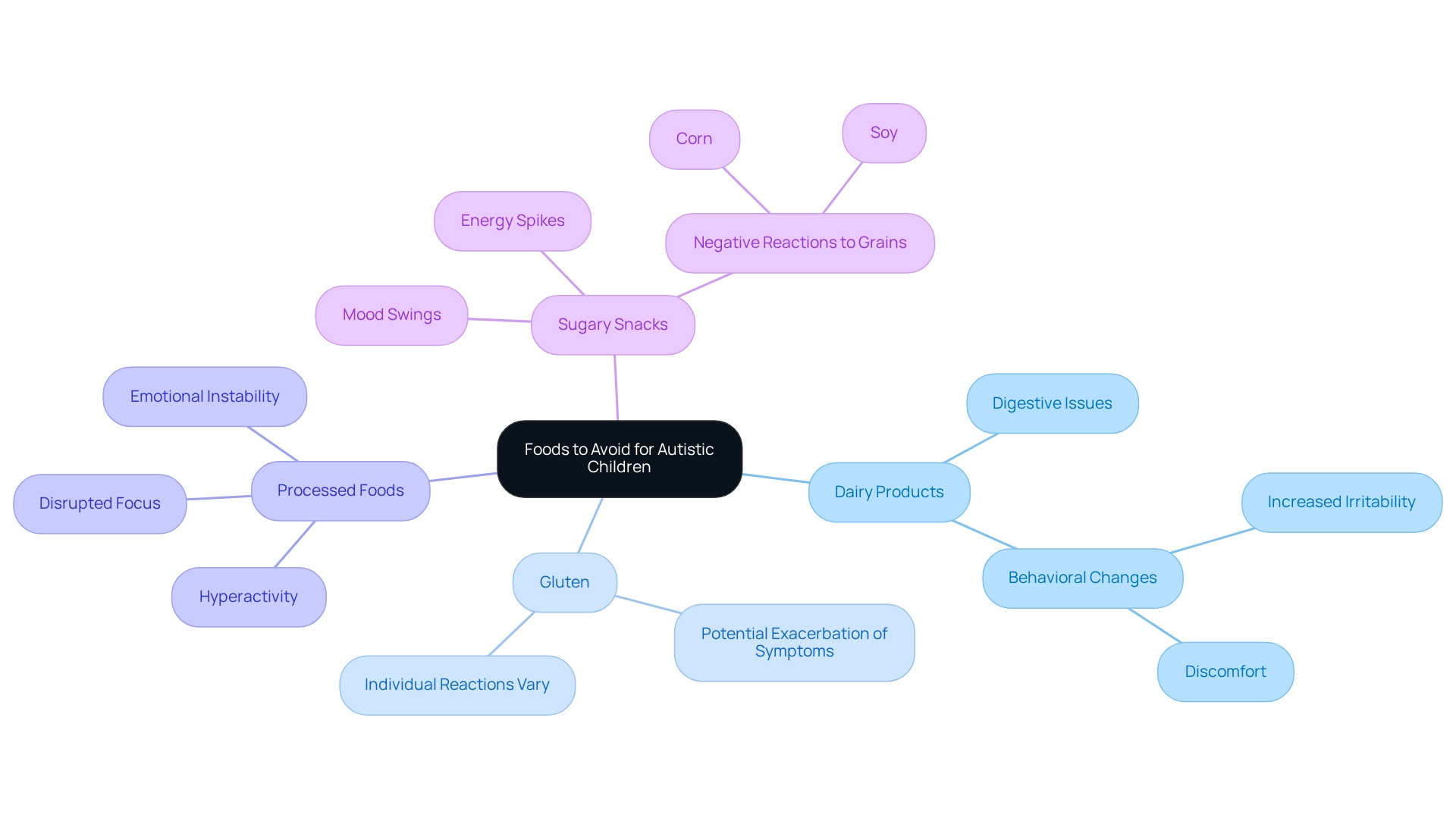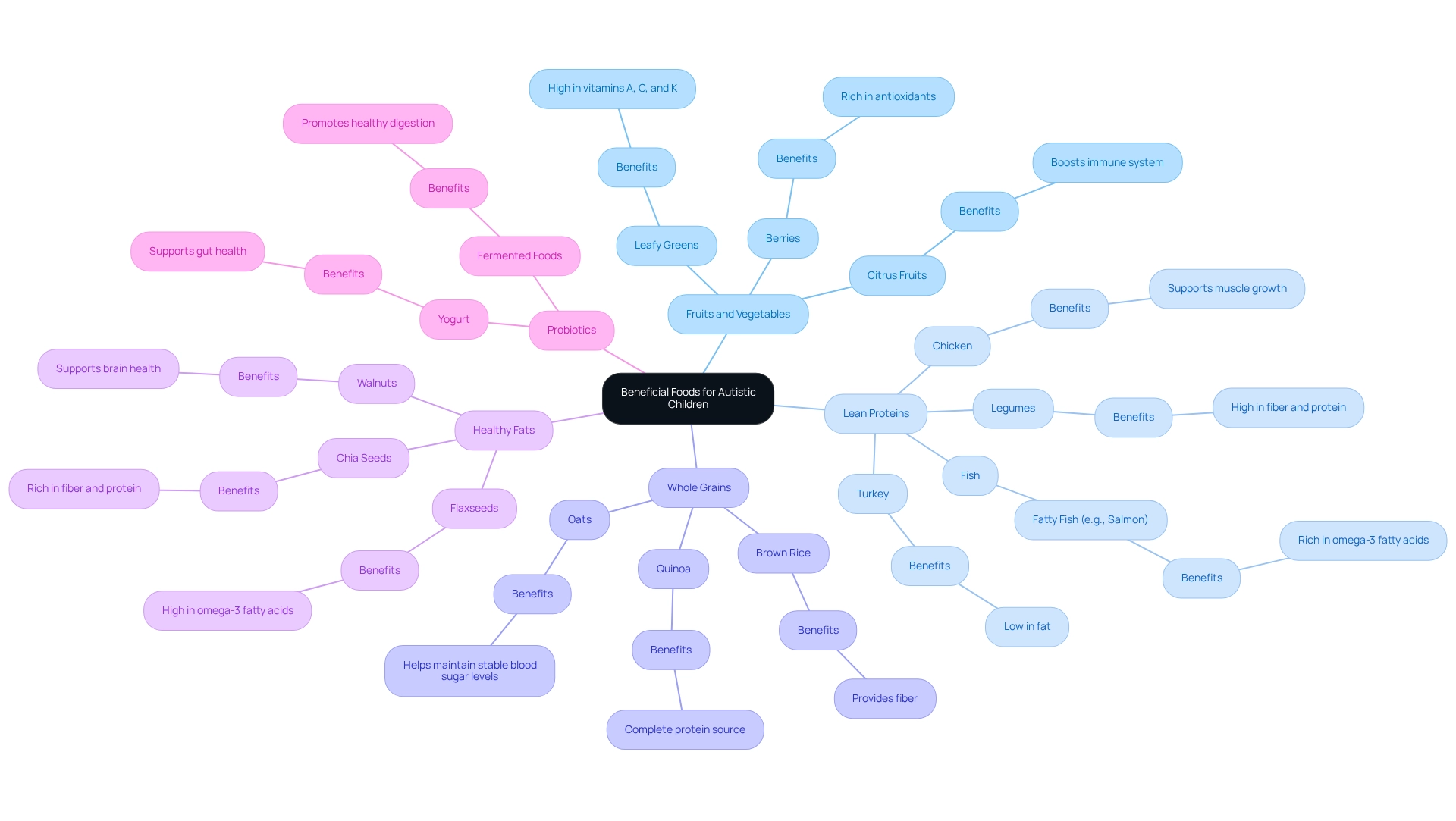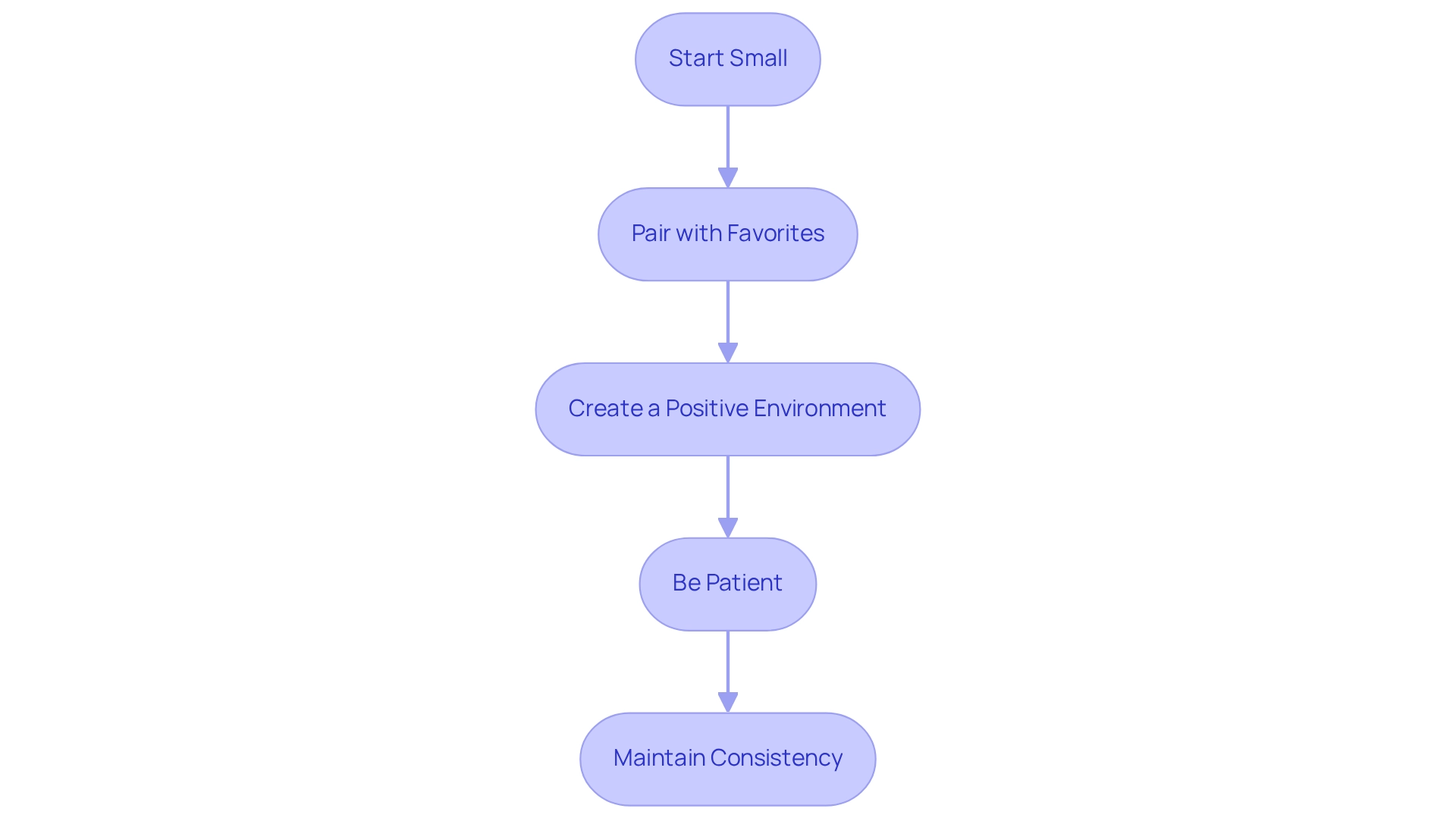Overview
Choosing the right food for your autistic child can feel overwhelming, but it doesn’t have to be. This article outlines four essential steps that can help you navigate this journey with care and understanding.
-
First, it’s crucial to recognize sensory sensitivities. Many children on the autism spectrum have unique reactions to different textures and flavors, which can significantly impact their eating habits. By understanding these sensitivities, you can make more informed choices that cater to their needs.
-
Next, avoiding certain harmful foods is vital. Some ingredients can exacerbate behavioral issues or lead to discomfort. By being mindful of what goes into their meals, you can help create a more positive eating experience.
-
Incorporating beneficial nutrients is another key step. Nutritional support can play a significant role in enhancing overall well-being and development. Think of it as a way to empower your child with the right fuel for their body and mind.
-
Lastly, implementing dietary changes gradually is essential. Sudden shifts can be challenging for children, so taking small, manageable steps allows for a smoother transition.
Each of these steps is backed by evidence and expert insights, reinforcing the idea that tailored dietary approaches can truly enhance the nutritional intake and overall well-being of children on the autism spectrum.
As you embark on this journey, remember that you are not alone. Many parents share similar experiences and challenges. Consider reaching out to communities or professionals who can provide support and resources. Together, we can create a nurturing environment that supports your child's unique needs.
Introduction
Navigating the dietary needs of children on the autism spectrum can feel like a complex journey for many parents and caregivers. With unique sensory sensitivities and varying food preferences, it becomes essential to tailor nutritional approaches that not only accommodate these challenges but also promote overall health and well-being. Recognizing foods to avoid—such as dairy and gluten—while incorporating nutrient-rich options like fruits, vegetables, and lean proteins can make a significant difference. Understanding the intricacies of dietary choices can profoundly impact behavior and development.
This article explores effective strategies for fostering healthier eating habits, implementing gradual dietary changes, and ultimately creating a supportive environment that encourages exploration and acceptance of diverse foods. Together, we can navigate this path toward better nutrition and well-being.
Understand Autism and Dietary Needs
Understanding how this condition impacts nutritional needs is vital for selecting the right food for autistic child. Many young individuals on the autism spectrum experience sensory sensitivities, which can significantly affect their preferences for food for autistic child. For instance, some may lean towards soft, creamy textures like yogurt, while others might favor crunchy snacks. This variability can often lead to a limited range of accepted food for autistic child, potentially resulting in nutritional deficiencies if not managed appropriately.
- Sensory Sensitivities: Recognizing your child's reactions to various textures and flavors is essential. These sensitivities not only affect which foods are accepted but also how they are perceived, making it crucial to observe and adapt to these preferences. Research shows that a significant number of children with autism exhibit these sensitivities, complicating their dietary choices.
- Routine and Structure: Creating a consistent meal schedule can offer your child a sense of security, encouraging them to gradually explore new foods. Predictability in mealtimes can alleviate anxiety around eating and foster a more positive experience.
Consulting with healthcare providers is important to ensure your child receives adequate food for autistic child, especially if they have a restricted diet. As Mohammed Al-Beltagi, a leading expert in the field, notes, "A thorough nutritional assessment is crucial for individuals with ASD due to the high prevalence of feeding difficulties, dietary restrictions, and GI issues in this population." A comprehensive nutritional evaluation is essential, as children with developmental disorders often face feeding challenges and gastrointestinal problems, making it important to consider the right food for autistic child. Furthermore, insights from case studies, such as 'Personalized Nutrition Plans for Autism,' highlight the effectiveness of tailored meal plans combined with behavioral strategies, which can significantly improve nutritional intake and overall health outcomes for children with autism.
By understanding these factors and fostering ongoing collaboration among healthcare providers, caregivers, and specialists, you can create a more personalized and supportive dietary approach that meets your child's unique needs, ultimately enhancing their overall health and well-being.
Identify Foods to Avoid
When organizing food for an autistic child, it’s crucial to recognize and avoid certain items that may adversely affect their behavior or health. Consider the following common items to remove from their diet:
- Dairy Products: Many children with developmental disorders exhibit sensitivities to dairy, which can lead to digestive issues and behavioral changes. Research indicates that these sensitivities may result in increased irritability and discomfort.
- Gluten: Some studies suggest that gluten may exacerbate symptoms in certain young individuals, indicating that reducing or eliminating gluten-containing foods could be beneficial. Although researchers found no significant link between autism and celiac disease based on genetic markers HLA-DQ2 and HLA-DQ8 alleles, individual reactions to gluten can vary.
- Processed Foods: Foods laden with additives, preservatives, and artificial ingredients are associated with hyperactivity and other behavioral challenges. These components can disrupt a child’s ability to focus and maintain emotional stability.
- Sugary Snacks: A high intake of sugar can lead to energy spikes followed by crashes, significantly impacting mood and behavior. Reducing sugary treats can help maintain a more stable energy level throughout the day. Additionally, some children may have negative reactions to grains like corn and soy, leading to digestive problems and behavioral changes.
Rebecca Jackson, a Chief Programs Officer and Brain Balance Expert, emphasizes the importance of understanding how food choices can influence learning and behavior in autistic youth. By steering clear of these items, you can foster a more stable and nurturing dietary environment, specifically when it comes to food for an autistic child, ultimately enhancing their overall well-being and behavior.

Incorporate Beneficial Foods and Nutrients
To promote the health and growth of your child, it's essential to prioritize food for autistic child that provides the beneficial nutrients they need. Consider these food categories:
- Fruits and Vegetables: Aim for a colorful variety to ensure a broad spectrum of vitamins and minerals. Berries, leafy greens, and citrus fruits are particularly beneficial.
- Lean Proteins: Include sources such as chicken, turkey, fish (especially fatty fish like salmon), and legumes to support growth and enhance brain health.
- Whole Grains: Choose whole grains like brown rice, quinoa, and oats, which provide fiber and help maintain stable blood sugar levels, crucial for overall health.
- Healthy Fats: Incorporate omega-3 fatty acids from sources like flaxseeds, chia seeds, and walnuts, known for their positive impact on brain function and development.
- Probiotics: Foods like yogurt (if tolerated) and fermented choices can support gut health, which is frequently associated with behavioral issues in individuals on the autism spectrum.
Studies show that at least 30 percent of children with developmental disorders fall into the obese category, highlighting the importance of a balanced diet. As Susan L. Hyman, MD, notes, "Nutrient Intake From Food in Children With Autism" is vital for their overall well-being. By focusing on these nutrient-dense foods, you can help ensure your child receives the necessary support for their physical and mental wellness, ultimately promoting healthier eating patterns and better health outcomes.
However, many families face challenges in encouraging healthy eating and finding appropriate food for autistic child, who may gravitate towards calorie-rich, low-nutrition foods. Future research should explore effective strategies to encourage healthier eating choices, ultimately supporting better health outcomes for autistic individuals. By understanding these challenges and implementing the suggested nutritional strategies, you can play a crucial role in reducing obesity risks and enhancing your child's nutritional intake.

Implement Dietary Changes Gradually
Introducing new items to your child's diet can feel daunting, but taking a gradual approach helps prevent overwhelming them. Here are some effective strategies to consider:
- Start small. Introduce one new food at a time, beginning with small portions. For instance, if your child enjoys mashed potatoes, try mixing in a small amount of mashed cauliflower to ease the transition.
- Pair new dishes with favorites. Combining unfamiliar foods with those your child already loves can make trying new things less intimidating and more appealing.
- Create a positive environment. Enhance mealtimes by involving your child in the cooking process or letting them choose which new dish to try. A positive atmosphere can encourage openness to new tastes.
- Be patient. Acceptance of new foods may take several attempts. Present the new dish without pressure, and celebrate small achievements when your child tries it. As noted by experts, patience is essential in this process. Allison Gonyon wisely states, "If a young person senses or fears that a specific item may trigger pain, they are likely to refuse it, become suspicious of it, or throw tantrums."
- Maintain consistency. Establishing a routine around mealtimes provides a sense of security, making your child more willing to explore new dishes.
Research shows that many young individuals with developmental disorders exhibit food selectivity, often consuming more salt than the recommended daily limit, highlighting the importance of choosing suitable food for autistic child. This highlights the nutritional challenges faced by children, especially concerning the food for autistic child. By implementing these strategies, you can support your child in expanding their diet in a nurturing and stress-free manner. Additionally, it's important to consider ethical aspects in nutritional research, ensuring that we understand these dietary changes responsibly while prioritizing the well-being of participants.

Conclusion
Navigating the dietary needs of children on the autism spectrum requires a thoughtful and individualized approach. It's essential to understand the impact of sensory sensitivities, establish a consistent meal routine, and recognize nutritional needs as foundational steps in crafting a supportive dietary environment. By being aware of foods that may need to be avoided—such as dairy, gluten, and processed items—parents can help mitigate potential behavioral and health issues.
Incorporating beneficial foods rich in essential nutrients is equally vital. A diet abundant in fruits, vegetables, lean proteins, whole grains, and healthy fats can significantly enhance overall health and development. As research suggests, the careful selection of these nutrient-dense foods can help combat common challenges, including obesity, and promote healthier eating habits among children on the spectrum.
Implementing dietary changes gradually is crucial to ensure a positive experience for children. Starting small, pairing new foods with favorites, creating a pleasant mealtime atmosphere, and exercising patience can facilitate acceptance of new tastes and textures. By fostering an encouraging environment, caregivers play a pivotal role in helping children expand their dietary horizons.
Ultimately, prioritizing a tailored approach to nutrition not only addresses the unique challenges faced by children with autism but also sets the stage for improved health outcomes and overall well-being. By embracing these strategies, families can navigate the complexities of dietary needs, ensuring that children thrive both physically and emotionally.
Frequently Asked Questions
Why is understanding nutritional needs important for autistic children?
Understanding nutritional needs is vital for selecting the right food for autistic children, as many experience sensory sensitivities that can significantly affect their food preferences.
How do sensory sensitivities impact food choices for autistic children?
Sensory sensitivities can lead to a limited range of accepted foods, as children may prefer certain textures and flavors. For example, some may prefer soft, creamy textures like yogurt, while others might favor crunchy snacks.
What role does routine and structure play in the dietary habits of autistic children?
Creating a consistent meal schedule can provide a sense of security, encouraging children to gradually explore new foods and alleviating anxiety around eating.
Why is it important to consult healthcare providers regarding the diet of autistic children?
Consulting healthcare providers is crucial to ensure that autistic children receive adequate nutrition, especially if they have a restricted diet, as they often face feeding difficulties and gastrointestinal issues.
What is the significance of a thorough nutritional assessment for individuals with autism?
A thorough nutritional assessment is essential due to the high prevalence of feeding difficulties, dietary restrictions, and gastrointestinal issues in children with autism spectrum disorder (ASD).
How can personalized nutrition plans benefit autistic children?
Tailored meal plans combined with behavioral strategies can significantly improve nutritional intake and overall health outcomes for children with autism, as highlighted by case studies.
What is the importance of collaboration among caregivers and healthcare providers in managing dietary needs?
Ongoing collaboration among healthcare providers, caregivers, and specialists is essential to create a personalized and supportive dietary approach that meets the unique needs of autistic children, enhancing their overall health and well-being.




